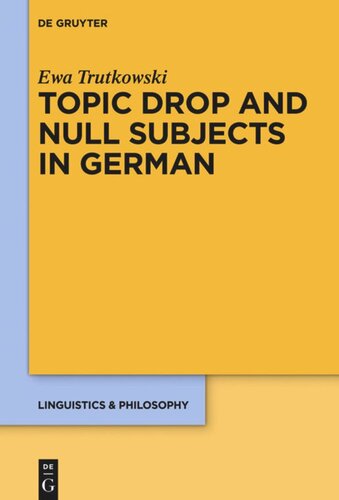

Most ebook files are in PDF format, so you can easily read them using various software such as Foxit Reader or directly on the Google Chrome browser.
Some ebook files are released by publishers in other formats such as .awz, .mobi, .epub, .fb2, etc. You may need to install specific software to read these formats on mobile/PC, such as Calibre.
Please read the tutorial at this link: https://ebookbell.com/faq
We offer FREE conversion to the popular formats you request; however, this may take some time. Therefore, right after payment, please email us, and we will try to provide the service as quickly as possible.
For some exceptional file formats or broken links (if any), please refrain from opening any disputes. Instead, email us first, and we will try to assist within a maximum of 6 hours.
EbookBell Team

0.0
0 reviewsThis monograph deals with argument drop in the German prefield and it presents new insights into null subjects, topic drop and the interpretation of topic dropped elements. Major issues are (inter alia) the drop of structurally vs. obliquely cased arguments and the question on which basis nominative/accusative and dative/genitive can be kept apart. Furthermore, it is shown that the (im)possibility of phi-feature mismatches concerning the antecedent and gap in topic drop dialogues allows to differentiate between coreference and "real" (quantifier) binding. Aside from topic drop, (1st/2nd vs. 3rd person) null subjects are investigated across a couple of unrelated languages, also focusing on the presence of syncretisms within verbal inflectional paradigms. It is proven that 1st/2nd person null subjects in German are not an instance of antecedent-dependent topic drop but that they are licensed by discrete verbal inflectional endings. Thus, according to this property, German can be classified as a partial pro-drop language. Next to theoretical discussions and considerations this book offers a broad (empirically covered) data basis, which makes it suitable for both theoretically and empirically interested (generative) linguists.